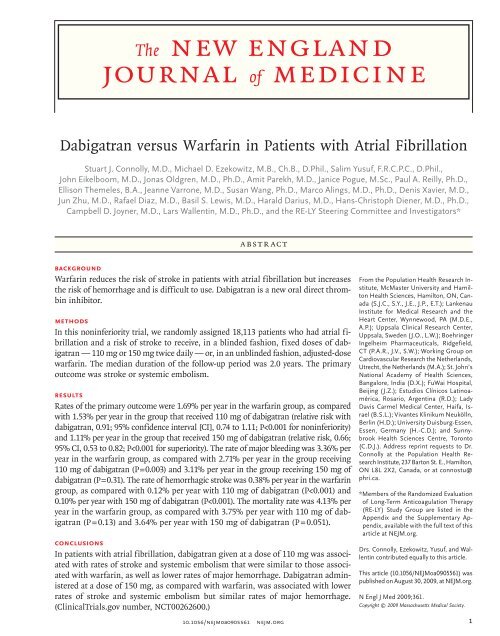

In September 1811, John Collins Warren, a Boston physician, along with James Jackson, submitted a formal prospectus to establish the New England Journal of Medicine and Surgery and Collateral Branches of Science as a medical and philosophical journal. The journal publishes editorials, papers on original research, review articles, correspondence, and case reports, and has a special section called "Images in Clinical Medicine". It describes itself as the oldest continuously published medical journal in the world. All participants were African and 50.7% of participants were female.The New England Journal of Medicine (NEJM) is an English-language peer-reviewed medical journal published by the Massachusetts Medical Society. The 1,800 participants were split into three age groups: 2-10 years, 11-17 years, 18-29 years.
New england journal of medicine trial#
Vaccinations for the trial took place in June 2021. “As a researcher in the continent, I am hopeful that relevant vaccines for the common strains within the meningitis belt region will be readily available for timely interventions due to the collaboration and teamwork of multicentre trials like ours. Having meningitis vaccines should be a public health priority to prevent catastrophic outcomes during an outbreak and would be a game changer in the fight against meningitis.

“Epidemic preparedness is the way forward in providing available, affordable and accessible vaccines relevant to regions prone to meningitis outbreaks. We hope it will ensure the goal of defeating epidemic meningitis by 2030, set out in the Global Roadmap, becomes a reality.”ĭr Ama Umesi, co-author from MRC Unit The Gambia at LSHTM, said: “Meningitis is a deadly disease with the ability to spread like wildfire in the event of an outbreak, this affects all ages most especially within the meningitis belt region. The new vaccine will be a critical tool to interrupting and preventing devastating epidemics of meningitis in the meningitis belt. We expect NmCV-5 to provide children and young adults with reliable protection against meningitis caused by the meningococcal bacteria.
New england journal of medicine license#
The trial was designed to provide WHO with the evidence needed to license the new vaccine for future epidemic control.ĭr Ed Clarke, a paediatrician from the Vaccines and Immunity Theme at MRC Unit The Gambia at LSHTM and co-author, said: “We are excited about the results of this study. More cost-effective production methods should mean that NmCV-5 can be made available at lower cost than existing quadrivalent vaccines, overcoming a major stumbling block to it being widely available across the ‘meningitis belt’. In addition, meningococcal X has emerged with potential to cause epidemics across the ‘meningitis belt’, so a vaccine to prevent against this strain is urgent.īuilding on the success of the Meningitis Vaccine Project (which developed MenAfriVac, a meningococcal A vaccine), the Serum Institute of India and PATH developed NmCV-5 with the goal of eliminating meningococcal disease in sub-Saharan Africa. Issues with supply and affordability have limited use of quadrivalent meningococcal vaccines across the ‘meningitis belt’, a swathe of sub-Saharan Africa at high-risk of epidemics of meningococcal and pneumococcal meningitis. The World Health Organization (WHO) estimates meningitis caused 250,000 deaths in 2019 and developing affordable vaccines providing broad coverage against meningococcal disease strains is a key part of its Defeating Meningitis by 2030 Global Roadmap. The study, led by a team including researchers from the Medical Research Council (MRC) Unit The Gambia at the London School of Hygiene & Tropical Medicine (LSHTM), and researchers from Bamako in Mali, is published in the New England Journal of Medicine. The trial found no safety concerns with NmCV-5. In addition, NmCV-5 induced a strong immune response to the emerging meningococcal X strain for which there is currently no licensed vaccine. The phase 3 trial compared the immune response generated by the new pentavalent vaccine NmCV-5 against that of the licensed quadrivalent MenACWY-D vaccine in 1,800 healthy 2-29-year-olds in Mali and The Gambia.Īfter 28 days, across all ages, the immune responses generated by a single dose of NmCV-5 were generally higher than those generated by MenACWY-D. A trial of a new vaccine against meningococcal disease, a cause of meningitis and blood poisoning, has found that it is safe and induces a strong immune response across five strains of meningococcal bacteria: A, C, W, Y and X.


 0 kommentar(er)
0 kommentar(er)
